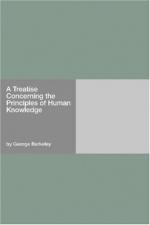[Note: “In truth the object and the sensation are the same thing, and cannot therefore be abstracted from each other—Edit 1710.”]
6. Some truths there are so near and obvious to the mind that a man need only open his eyes to see them. Such I take this important one to be, viz., that all the choir of heaven and furniture of the earth, in a word all those bodies which compose the mighty frame of the world, have not any subsistence without a mind, that their being (ESSE) is to be perceived or known; that consequently so long as they are not actually perceived by me, or do not exist in my mind or that of any other created spirit, they must either have no existence at all, or else subsist in the mind of some eternal spirit—it being perfectly unintelligible, and involving all the absurdity of abstraction, to attribute to any single part of them an existence independent of a spirit [Note.]. To be convinced of which, the reader need only reflect, and try to separate in his own thoughts the being of a sensible thing from its being perceived.
[Note: “To make this appear with all the light and evidence of an axiom, it seems sufficient if I can but awaken the reflection of the reader, that he may take an impartial view of his own meaning, and in turn his thoughts upon the subject itself, free and disengaged from all embarrass of words and prepossession in favour of received mistakes.”—Edit 1710]
7. Second argument.[Note.]—From what has been said it follows there is not any other substance than spirit, or that which perceives. But, for the fuller proof of this point, let it be considered the sensible qualities are colour, figure, motion, smell, taste, etc., i.e. the ideas perceived by sense. Now, for an idea to exist in an unperceiving thing is a manifest contradiction, for to have an idea is all one as to perceive; that therefore wherein colour, figure, and the like qualities exist must perceive them; hence it is clear there can be no unthinking substance or substratum of those ideas.




